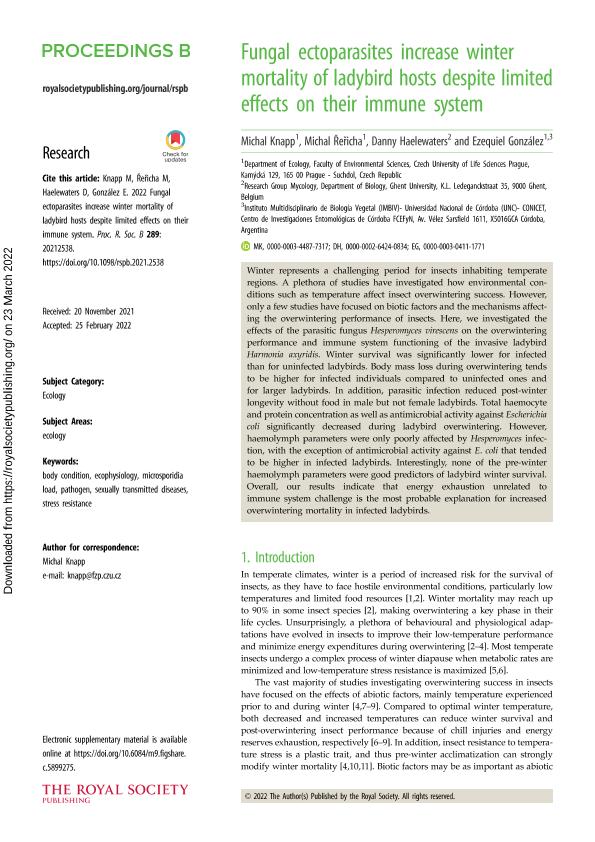Mostrar el registro sencillo del ítem
dc.contributor.author
Knapp, Michal
dc.contributor.author
Řeřicha, Michal
dc.contributor.author
Haelewaters, Danny
dc.contributor.author
González, Ezequiel

dc.date.available
2023-06-14T17:23:18Z
dc.date.issued
2022-03
dc.identifier.citation
Knapp, Michal; Řeřicha, Michal; Haelewaters, Danny; González, Ezequiel; Fungal ectoparasites increase winter mortality of ladybird hosts despite limited effects on their immune system; The Royal Society; Proceedings of the Royal Society of London. Series B: Biological Sciences; 289; 1971; 3-2022; 1-10
dc.identifier.issn
0962-8452
dc.identifier.uri
http://hdl.handle.net/11336/200617
dc.description.abstract
Winter represents a challenging period for insects inhabiting temperate regions. A plethora of studies have investigated how environmental conditions such as temperature affect insect overwintering success. However, only a few studies have focused on biotic factors and the mechanisms affecting the overwintering performance of insects. Here, we investigated the effects of the parasitic fungus Hesperomyces virescens on the overwintering performance and immune system functioning of the invasive ladybird Harmonia axyridis. Winter survival was significantly lower for infected than for uninfected ladybirds. Body mass loss during overwintering tends to be higher for infected individuals compared to uninfected ones and for larger ladybirds. In addition, parasitic infection reduced post-winter longevity without food in male but not female ladybirds. Total haemocyte and protein concentration as well as antimicrobial activity against Escherichia coli significantly decreased during ladybird overwintering. However, haemolymph parameters were only poorly affected by Hesperomyces infection, with the exception of antimicrobial activity against E. coli that tended to be higher in infected ladybirds. Interestingly, none of the pre-winter haemolymph parameters were good predictors of ladybird winter survival. Overall, our results indicate that energy exhaustion unrelated to immune system challenge is the most probable explanation for increased overwintering mortality in infected ladybirds.
dc.format
application/pdf
dc.language.iso
eng
dc.publisher
The Royal Society

dc.rights
info:eu-repo/semantics/openAccess
dc.rights.uri
https://creativecommons.org/licenses/by-nc-sa/2.5/ar/
dc.subject
BODY CONDITION
dc.subject
ECOPHYSIOLOGY
dc.subject
MICROSPORIDIA LOAD
dc.subject
PATHOGEN
dc.subject
SEXUALLY TRANSMITTED DISEASES
dc.subject
STRESS RESISTANCE
dc.subject.classification
Biología

dc.subject.classification
Ciencias Biológicas

dc.subject.classification
CIENCIAS NATURALES Y EXACTAS

dc.title
Fungal ectoparasites increase winter mortality of ladybird hosts despite limited effects on their immune system
dc.type
info:eu-repo/semantics/article
dc.type
info:ar-repo/semantics/artículo
dc.type
info:eu-repo/semantics/publishedVersion
dc.date.updated
2023-06-12T13:47:13Z
dc.identifier.eissn
1471-2954
dc.journal.volume
289
dc.journal.number
1971
dc.journal.pagination
1-10
dc.journal.pais
Reino Unido

dc.description.fil
Fil: Knapp, Michal. Czech University Of Life Sciences Prague; República Checa
dc.description.fil
Fil: Řeřicha, Michal. Czech University Of Life Sciences Prague; República Checa
dc.description.fil
Fil: Haelewaters, Danny. University of Ghent; Bélgica
dc.description.fil
Fil: González, Ezequiel. Czech University Of Life Sciences Prague; República Checa. Consejo Nacional de Investigaciones Científicas y Técnicas. Centro Científico Tecnológico Conicet - Córdoba. Instituto Multidisciplinario de Biología Vegetal. Universidad Nacional de Córdoba. Facultad de Ciencias Exactas Físicas y Naturales. Instituto Multidisciplinario de Biología Vegetal; Argentina
dc.journal.title
Proceedings of the Royal Society of London. Series B: Biological Sciences

dc.relation.alternativeid
info:eu-repo/semantics/altIdentifier/doi/http://dx.doi.org/10.1098/rspb.2021.2538
dc.relation.alternativeid
info:eu-repo/semantics/altIdentifier/url/https://royalsocietypublishing.org/doi/10.1098/rspb.2021.2538
Archivos asociados
